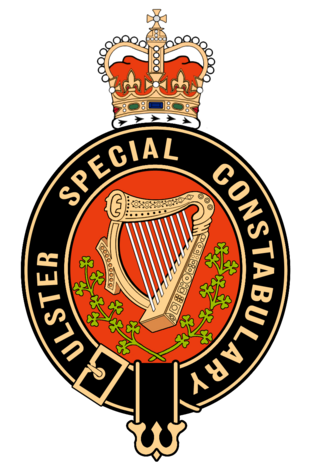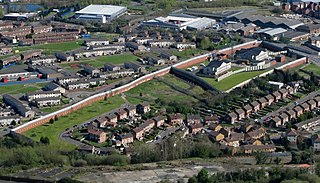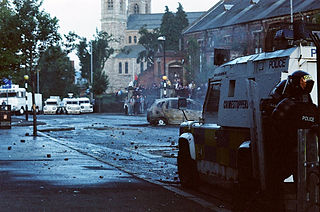Related Research Articles

The Continuity Irish Republican Army, styling itself as the Irish Republican Army, is an Irish republican paramilitary group that aims to bring about a united Ireland. It claims to be a direct continuation of the original Irish Republican Army and the national army of the Irish Republic that was proclaimed in 1916. It emerged from a split in the Provisional IRA in 1986 but did not become active until the Provisional IRA ceasefire of 1994. It is an illegal organisation in the Republic of Ireland and is designated a terrorist organisation in the United Kingdom, New Zealand and the United States. It has links with the political party Republican Sinn Féin (RSF).

The Royal Ulster Constabulary (RUC) was the police force in Northern Ireland from 1922 to 2001. It was founded on 1 June 1922 as a successor to the Royal Irish Constabulary (RIC) following the partition of Ireland. At its peak the force had around 8,500 officers, with a further 4,500 who were members of the RUC Reserve.

The Police Service of Northern Ireland (PSNI; Irish: Seirbhís Póilíneachta Thuaisceart Éireann; Ulster-Scots: Polis Service o Norlin Airlan), officially the Police Service of Northern Ireland (incorporating the Royal Ulster Constabulary), is the police service responsible for law enforcement and the prevention of crime within Northern Ireland.

The Ulster Special Constabulary was a quasi-military reserve special constable police force in what would later become Northern Ireland. It was set up in October 1920, shortly before the partition of Ireland. The USC was an armed corps, organised partially on military lines and called out in times of emergency, such as war or insurgency. It performed this role most notably in the early 1920s during the Irish War of Independence and the 1956–1962 IRA Border Campaign.
The Independent Commission on Policing for Northern Ireland was established in 1998 as part of the Belfast Agreement, intended as a major step in the Northern Ireland peace process. Chaired by Conservative politician and the last Governor of Hong Kong Chris Patten, it was better known as the Patten Commission and it produced a report in 1999 known as the Patten Report. The other members of the Commission were Maurice Hayes, Peter Smith, Kathleen O'Toole, Gerald W. Lynch, Sir John Smith, Lucy Woods and Professor Clifford Shearing. The Secretary to the Commission was Bob Peirce, who drafted the report.
A police authority in the United Kingdom is a public authority that is responsible for overseeing the operations of a police force. The nature and composition of police authorities has varied over time, and there are now just four dedicated "police authorities" in the United Kingdom, although the term can refer to various similar successor bodies.
Rule 21 of the Gaelic Athletic Association (GAA) was a rule in force from 1897 to 2001 which banned members of the British security forces from membership of the GAA and thus from playing Gaelic games. The affected organisations included the British Armed Forces and the Royal Ulster Constabulary (RUC), and prior to partition, the Royal Irish Constabulary (RIC) and Dublin Metropolitan Police. As well as the RUC in Northern Ireland, it also applied to police forces in Great Britain, which affected London GAA and the other British GAA affiliates.
Sir Ronald Flanagan is a retired senior Northern Irish police officer. He was the Home Office Chief Inspector of Constabulary for the United Kingdom excluding Scotland. Sir Ronnie was previously the Chief Constable of the Police Service of Northern Ireland (PSNI) since its creation in 2001 to 2002, and had been Chief Constable of its predecessor, the Royal Ulster Constabulary (RUC) until 2001.

The Historical Enquiries Team was a unit of the Police Service of Northern Ireland set up in September 2005 to investigate the 3,269 unsolved murders committed during the Troubles, specifically between 1968 and 1998. It was wound up in September 2014, when the PSNI restructured following budget cuts.

The Office of the Police Ombudsman for Northern Ireland is a non-departmental public body intended to provide an independent, impartial police complaints system for the people and police under the Police Acts of 1998 and 2000.
This is a chronology of activities by the Continuity Irish Republican Army (CIRA), an Irish republican paramilitary group. The group started operations in 1994, after the Provisional Irish Republican Army began a ceasefire.

Safeguarding is a term used in the United Kingdom, Ireland and Australia to denote measures to protect the health, well-being and human rights of individuals, which allow people—especially children, young people and vulnerable adults—to live free from abuse, harm and neglect.

Segregation in Northern Ireland is a long-running issue in the political and social history of Northern Ireland. The segregation involves Northern Ireland's two main voting blocs—Irish nationalist/republicans and British unionist/loyalist. It is often seen as both a cause and effect of the "Troubles".

The Police Act 2000 is an Act of the Parliament of the United Kingdom. The act renamed the Royal Ulster Constabulary (RUC) to the Police Service of Northern Ireland (PSNI). It also created the Northern Ireland Policing Board and District Police Partnerships. The act was designed to gain cross-community support for law enforcement in Northern Ireland with several initiatives included in the act, including a change of oath of office and a 50:50 recruitment policy for Protestants and Roman Catholics.
The Police Federation for Northern Ireland (PFNI) is the representative body to which all members of the Police Service of Northern Ireland belong up to and including the rank of Chief Inspector, as well as the ranks of reserve and part-time officers. The federation was established on 15 July 1971 as a result of the Police Act (NI) 1970. There are 6800 members as of June 2016 according to their website and the current chairman is Liam Kelly.

The National Crime Agency (NCA) is a national law enforcement agency in the United Kingdom. It is the UK's lead agency against organised crime; human, weapon and drug trafficking; cybercrime; and economic crime that goes across regional and international borders, but it can be tasked to investigate any crime. The NCA has a strategic role as part of which it looks at serious crime in aggregate across the UK, especially analysing how organised criminals are operating and how they can be disrupted. To do this, it works closely with regional organised crime units (ROCUs), local police forces, and other government departments and agencies.

The dissident Irish republican campaign began at the end of the Troubles, a 30-year political conflict in Northern Ireland. Since the Provisional Irish Republican Army called a ceasefire and ended its campaign in 1997, breakaway groups opposed to the ceasefire and to the peace agreements have continued a low-level armed campaign against the security forces in Northern Ireland. The main paramilitaries involved are the Real IRA, Continuity IRA and formerly Óglaigh na hÉireann. They have targeted the Police Service of Northern Ireland (PSNI) and the British Army in gun and bomb attacks as well as with mortars and rockets. They have also carried out bombings that are meant to cause disruption. However, their campaign has not been as intensive as the Provisional IRA's, and political support for groups such as the Real IRA is "tending towards zero".

The 2011 Northern Ireland riots were a series of riots between 20 June 2011 and 16 July 2011, starting originally in Belfast, before spreading to other parts of Northern Ireland. They were initiated by the Ulster Volunteer Force.
Ronan Kerr was a Police Service of Northern Ireland (PSNI) officer killed by a booby-trap car bomb planted outside his home on 2 April 2011 at Highfield Close, just off the Gortin Road, near Killyclogher on the northern outskirts of Omagh in County Tyrone. Responsibility for the attack was later claimed by a dissident republican group claiming to be made of former members of the Provisional IRA.
References
- ↑ PSNI 2011 workforce composition figures from official website
- ↑ BBC news report of 2009 workforce monitoring report
- ↑ the Irish Times report, retrieved 11 May 2021